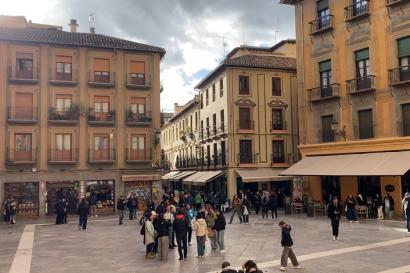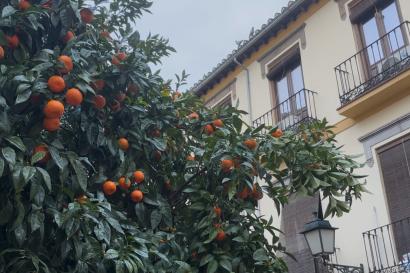Catalonians have been pushing for independence for decades, and October 1 was the climax of the movement, when citizens across Catalonia (ilegally, according to Spain's constitution) voted si or no to whether or not they wanted to secede from Spain. For the past month that I've been here, I've heard varying opinions about the movement from Barcelonians, other Catalonians, Spaniards outside of the Catalan region and my IES Abroad profesors. As I'm not a Spanish citizen, I don't have the right to hold an opinion about the situation, but I've absorbed what Spaniards have told me and I'm fascinated by the movement.
The protests and demonstrations throughout Catalonia had been peaceful leading up to the referendum, thus prompting only a few international news outlets to cover the topic. However, on October 1 when the Spanish police were actively blocking citizens from voting and injuring hundreds of Catolonians in the process- which were all caught on camera- the international news media jumped into action publishing breaking news articles about the "violent crisis" in Catalonia.
It was interesting to be on the other side of the international news cycle. Usually, I'm reading about international situations via U.S. news outlets while in the U.S. However, yesterday, I was reading U.S. news articles about an international situation that I was present for. And it taght me an important lesson: take the news with a grain of salt, especially when it's about another country.
CNN had a headline out yesterday entitled "The shame of Europe" about the situation in Catalonia. Many other headlines focused on "smashed doorways and rubber bullets" or the "hundrds injured". And all of them used pictures of old women with bloody faces or a policeman dragging someone out of a polling center.
In reality, this escalated violence was only occuring at a few polling sites. When I walked around my neighborhood in the Eixample, a very central part of Barcelona, the streets were eerily quiet and there were few policemen around. The media skewed the situation to seem like this violence was occuring throughout the region and that Catalonia was in a chaotic state.
My hope is that the media will continue to cover this movement and these next important days following the vote, even if there's a lack of "drama" present involving police-civilian confrontation. Articles should not be published because they're "clickable" to increase readership, but rather because they are about a truly newsworthy topic that the public should be informed about. And the media was trying to inform the global public about that day's events; however, there was some misinformation too.
For me, these next couple of days will be even more interesting than the actual referendum day because it's time for the Spanish government to react to the results and to whatever Puigdemont declares. There's multiple options that President Rajoy can take, and it will be interesting to see which path he decides to go down.

Abigail Summerville
I'm excited to meet local people who have lived in Barcelona their whole lives who can tell me all about it- the history, culture, food, architecture, and the best places to visit. I'm also excited to meet the other students in the program and make lasting friendships. And I LOVE adventures, and can't wait to travel around Spain and to other countries as well.








